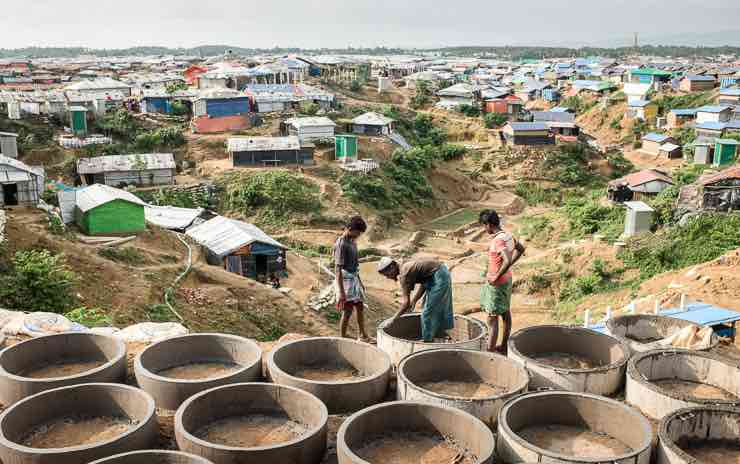Global hunger has been on the rise for the past three years, and the plight of hundreds of millions struggling with acute and chronic hunger has resulted largely from conflict: More than half of all undernourished people live in conflict-affected countries.
In 2018, an estimated 41.3 million people were identified as being internally displaced because of armed conflict, and 29.4 million as refugees or asylum seekers. Currently, an estimated 600 million young people live in fragile or conflict-affected areas. These numbers are going up as conflicts have increased around the world.
The relationship between conflict and food insecurity is complex and varied, and all too often it creates a feedback loop of human suffering. Chapter 5 of IFPRI’s 2020 Global Food Policy Report explores this dynamic and outlines policies to build more inclusive food system that address the predicament of displaced people.
Conflict has extensive impacts on food systems, disrupting entire food value chains from production to marketing. Flows of refugees from conflicts compound these effects by straining food availability and access both in host communities and areas refugees leave behind.
At the same time, food insecurity can also be a trigger of conflict and forced migration. For example, food price spikes in countries with weak governments may create feelings of marginalization and dispossession, damaging the social cohesion in local communities and prompting political unrest and even violent conflict.
Breaking this cycle requires innovative and lasting solutions. Strengthening food supply chains can play a central role. Integrating forcibly displaced and conflict-affected people into food systems can help them rebuild their lives, reduce one potential source of conflict, and benefit local economies.
Developing innovations that include displaced and conflict-affected people in food systems is difficult and there is no panacea. However, there are several examples of promising responses that foster food security, peace, and inclusive agri-food systems.
Providing long-term refugees access to land and livelihoods helps them and their host communities thrive. For example, Uganda’s Refugee Policy (2006) and Refugee Regulations (2010) grant the country’s 1.2 million refugees access to land, freedom of movement, and the right to seek employment. These inclusive policies and regulations help refugees build independent livelihoods and achieve food security while strengthening local economies.
Investing in agricultural and food economies also helps integrate conflict-affected people by allowing them to move beyond subsistence farming, rejoin exchange markets, invest in adopting resilient practices, and remain in their communities when it is safe. Returning to the example of Uganda, the Peace, Recovery, and Development Plan for the country’s Northern Region prioritized agriculture investments and peace-building efforts, after decades of armed conflict. These initiatives spurred major improvements in food security and nutrition in the region; the Acholi people, who were entirely dependent on international food assistance during the conflict, have not needed any food assistance since 2011.
In addition to agricultural investments, stimulating the overall local economies where conflict-affected people live effectively supports and encourages integration. In post-conflict Colombia, the 2016 peace agreement outlines a comprehensive plan to provide services and benefits to victims, including: Land access to dispossessed and displaced farmers; improved infrastructure, agricultural practices, and natural resources management; agri-food value chain development; employment programs; and social protection mechanisms. These efforts should help conflict-affected families increase food production, restore local market infrastructure, and social cohesion to the benefit of all.
Designing and implementing inclusive strategies is challenging, and the local politics of investing in social support for newcomers or rebuilding war-torn areas can be daunting; but these examples demonstrate how such approaches can be effective if built on clear and in-depth understandings of the root causes of conflicts, forced migrations, and food crisis, and how they interact and affect one another.
There is no one guaranteed approach to foster lasting peace, food system recovery, or the restoration of livelihoods, but by focusing on inclusive food systems, policy makers can help conflict-affected people rebuild their lives and livelihoods, reduce conflict, and reinvigorate local economies.
Rob Vos is the Director of IFPRI’s Markets, Trade, and Institutions Division. Julia Wilson is a former IFPRI Communications Intern.







